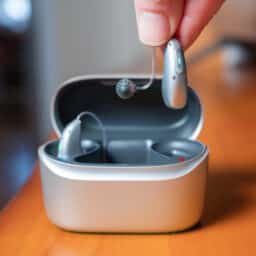Love and Listening: Communication Tips for Valentine’s Day

Communication is the bedrock of a strong, healthy relationship. If you’re among the more than 10% of people in the United States with hearing loss, you may have dealt with difficult communication in the past. This Valentine’s Day, take a look at our list of tips to establish healthy communication with your significant other. 1….
Why You Should Schedule a Hearing Test This Year

With the New Year in full swing, many people are taking a little extra time to consider how they can improve their health and wellness. One thing that often gets left out of the discussion, but is incredibly important, is hearing testing. Why Are Hearing Tests Important? Although some hearing loss can spring on you…
How Hearing Aids Strengthen Relationships

Untreated hearing loss takes its toll on our ability to communicate. And how we communicate affects how easily we build strong relationships. Let’s look at three ways hearing aids can help strengthen relationships for the 15% of U.S. adults with hearing loss. Increasing Your Social Confidence It can be hard to struggle with something that…
Tips and Tricks for Shopping With Hearing Loss

Whether you love to shop or think of it more as a chore, it’s something we all have to do. If you’re among the 20% of people with hearing loss, you might find shopping, especially during busy holiday months, a little more taxing. The sounds of fellow shoppers, cash registers, music through the speakerphones and…
Hearing Aids and Holidays: How Better Hearing Reduces Stress at Family Gatherings

Hearing aids are small but technologically brilliant devices that collect and amplify speech while reducing irrelevant background noise. They help you keep up at work, stay alert during traffic and speak with the cashier at Food Lion. The everyday clearer communication they offer is dazzling, but every once in a while, your hearing aids like…
Finding Calm When Holiday Stress Affects Your Tinnitus

The Busch Gardens Christmas Town light show is finally up, and that means the holidays are here. Before you start checking off the items on your holiday to-do list, consider adding one more thing: stress relief. Stress has a way of sneaking in during the holidays, whether from hectic Thanksgiving grocery shopping or a few…
Halloween Tips for Families With Hearing Loss

Halloween is almost here, and that means you’re getting all your costumes in order, buying bags of candy and maybe planning your trick-or-treating routes. If one or more of the children in your family has hearing loss, you also need to think about how to accommodate them during the festivities. Let’s take a look at…
Do I Need Hearing Aids for Mild Hearing Loss?

Many people avoid going to the doctor, especially if they believe their conditions or symptoms are mild. One area where we see this avoidance in full force is hearing loss treatment. A 2018 study on early hearing loss intervention in adults found that only about 20% of people with inner ear (permanent) hearing loss seek…
Today’s Hearing Aids: Sleek, Smart and Simple To Use

Many know that frustrating experience of getting a new phone or laptop and struggling to figure out how to use it. If you’re among that group, you might even avoid getting new electronics altogether. While that avoidance is natural, it’s essential to push past it when hearing aids are concerned. Today’s new hearing aids are…
Five Signs It’s Time for a Hearing Test

Hearing loss affects more than 10% of the United States population. Despite its prevalence, many people don’t notice their hearing loss, or they assume it’s not advanced enough to require treatment. While that belief is common, it’s not accurate. Even mild hearing loss can make communication difficult, impact your social life and cause trouble at…
